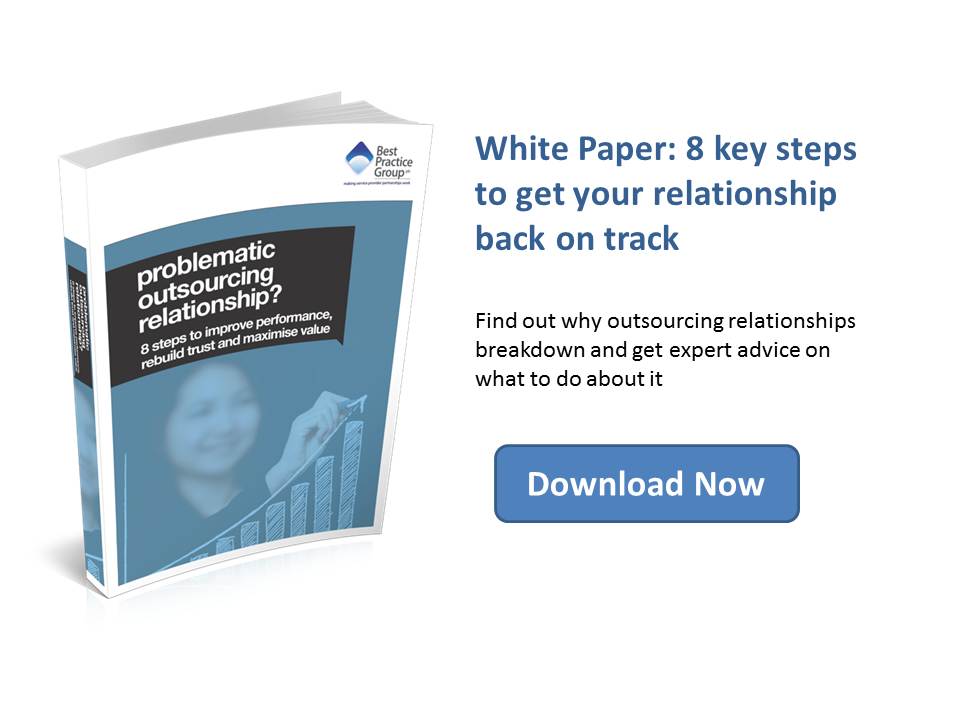 As news circulated about Serco’s fourth profit warning in a year and plans for a rights issue to the tune of £550m to stabilise their battered and beleaguered balance sheet, we have seen an increase in contact by some of their customers. Their overarching concern is that they want to know what early investigation or process they should be adopting if their troubled outsourced partner starts to crack under the strain.
As news circulated about Serco’s fourth profit warning in a year and plans for a rights issue to the tune of £550m to stabilise their battered and beleaguered balance sheet, we have seen an increase in contact by some of their customers. Their overarching concern is that they want to know what early investigation or process they should be adopting if their troubled outsourced partner starts to crack under the strain.
In our experience of dealing with hundreds of service provider relationships, a common theme we see is that when financial difficulties beset a strategic provider, falling service levels and ‘chargeable changes in scope’ often go hand in hand. With so much at stake to ensure your continuity of service, it’s important to have a plan of action in reserve just in case your outsourced provider relationship takes an unexpected turn.
Over the years, we have worked with clients and suppliers to help them to find a way through problematic periods to ensure that those who rely on their outsourced services or on the timely completion of a project are protected from the fallout that often occurs when the warning signs appear. But what are those warning signs?
To help identify these signs, we have decided to develop a ‘Survival Guide for Worried Clients’. But first let’s look at what has brought Serco to this point.
Serco’s troubled times
Being embroiled in the year’s most heavily publicised and controversial scandal is bound to have an effect on a business. That is exactly what happened last summer when Serco received the wrong kind of attention for overcharging on their government contract to electronically tag criminals. When it was discovered that some of those they were charging for were already in jail, had been released, or were in fact deceased, this caused a media field day. As a result, Serco went from being perceived as one of the leaders in their field to being stripped of this contract and banned from bidding for all government contracts for a period of six months. This, along with some other issues, proved a massive blow that wiped 50% off the market value of the business and cost Group Chief Executive Chris Hyman his job.
When Rupert Soames took over this mantle in June, it was apparent from press reports that he had a ‘mountain to climb’ to turn Serco’s fortunes around. With promises of sweeping changes, he initiated a comprehensive review to uncover all the hidden failings that were impacting the progress of the organisation.
Once this was complete just weeks ago, he then took the brave move of announcing their findings to the public at large. My view is that this statement of forthright openness has to be applauded. There is a common thread in organisations that both perform well and are trusted by their clients, and that are looking for strategic partners where their senior management team ‘lead by example’.
In other words, if this lead in openness is reflected quickly through the behaviours (rather than rhetoric speak) in the operational layers of the organisation, it will do three things (1) rebuild trust with its client base, (2) re-engage its management and operational staff to be proud of the organisation they work for, and (3) create a trusted and proud organisational workforce that is motivated to help their clients achieve excellent business outcomes which in turn, means far more work and new, innovative and profitable projects for them to work on. A great win-win for both client and provider.
What Soames revealed was a catalogue of issues which include somewhere in the region of £450m of troubled contracts and projects where the organisation was going to lose (or was already losing) money. Chief among these was the agreement they have to service and maintain Australian naval vessels. When it was discovered that many of the ships had design faults, it escalated their servicing needs. This meant that a potentially profitable contract became one that will now cost them £10–15m a year for the next seven years. Questions have to be asked whether all due diligence was carried out here? Was it a fundamental error of judgement? Or was it a strategic decision by the organisation to demonstrate its capability in this field to generate more profitable work across the world?
Analysts believe that to turn the business around will be a long and arduous task. Mr Soames, after reviewing the bleak results of his review of the business, is reported as saying: “The only interest I have in the past is bloody well learning the lessons from it and learning to say no to some contracts.”
Mr Soames has decided to focus all of Serco’s efforts on government contracts, which they are now once more able to bid for. Our view is that his airing of the organisation’s ‘dirty laundry’ is a sign that there is willingness to change by leading from the front, and to do better in the future by being more transparent in their dealings.
Serco’s immediate future is by no means set in stone and there are bound to be lean years ahead, so what should you do if your strategic partner is showing worrying signs of financial difficulties?
Survival Guide for Worried Clients
1. Forewarned is forearmed
It might all be a flash in the pan, a worry about nothing, a media exaggeration, an unfounded rumour. But what if it isn’t? You will hear us talk time and again of the importance of your Intelligent Client Function (ICF) team , and there is good reason for this. These are the people whose role it is to build strong, trusting relationships with their counterparts on the supplier side. Through these relationships and their monitoring and analysis responsibilities, they provide you with the early warning system that should inform you of issues that could cause your service delivery to veer off track. Not only does your ICF team keep a watchful eye out for trouble, but they are also often best placed for suggesting solutions and negotiating multilateral support for ongoing service delivery – all much more complicated should you not have the in-house talent that has built strong, trusted relationships with your provider, and that also has the authority to take such decisive action.
2. Challenge poor value
When your service provider is experiencing financial and/or operational challenges, often the first sign, especially if you don’t have a properly resourced ICF team, is a fall in service levels. To allow these challenges to continue can be seen as encouragement through inactivity. Such a situation is only likely to get worse over time. Degrading service levels need to be addressed at the earliest possible juncture with expectations reiterated in no uncertain terms, and then progress back towards agreed standards must be monitored. When an organisation’s financial future looks uncertain it will look to make cutbacks both in its efforts and in its staffing. If your partnership has been hit by such a frugal move by your supplier then you will no doubt notice that communication delays may become commonplace, that those you have come to rely on may no longer be available, that innovation is no longer forthcoming and expected business outcomes are delayed.
3. Check your contract
Contracts, at least well drafted contracts, should provide for such events in a practical manner. Suppliers looking to scrimp on their responsibilities can be encouraged back into line, if not through negotiation, through the enforcement of their contractual responsibilities. It is, therefore, important that you check your contract so you are well versed in the escalation procedures should they become necessary. Contracts should also be reviewed should the situation get so bad that you start to consider moving some or all of your relationship to another provider. Such a move should be considered as a last resort due to the complex, time-consuming, and often costly nature of such an action. But, there will be times when a supplier in difficulty could welcome the relief they might experience by allowing an additional supplier to become involved and take over a particularly complex portion of a project or contract. The challenge in this is ensuring you manage any intervention in such a way that you do not erode your suppliers ‘expert responsibilities’.
4. Plan for the worst, hope for the best
Not only are you perfectly within your rights to plan for the worst with a back-up supplier waiting in the wings, but you have an executive duty to do so to minimise the risk to your organisation of failed service delivery. For organisations in the public sector, there are ways to safely navigate your way through the EU procurement rules in the event of the potential risk that your service provider may fail in its duties.
You might find it provides great peace of mind to start having informal discussions with alternate suppliers with a view to them taking over some or all of the responsibilities from your current supplier, should you be unable to resolve the issues that are holding the project or strategic relationship back.
If issues with your provider, or their financial situation, degrade to a certain level you may wish to move things forward with your alternate supplier and make sure you have brought them up to speed and have contractual agreements in place should you need them to step in at a moment’s notice. The most important thing, at the end of the day, is that the risk of those who rely on your services, or on the completion of a project, being affected by issues with your current supplier are minimised.
If you are experiencing problems with your supplier relationships you might find our white paper on the subject a useful first step to a resolution.
As for Serco, they will undoubtedly have a bumpy road ahead of them. Their recent admissions to failings will resonate with some who’ll consider them enlightened and remorseful. Others will simply see more reasons to question their capabilities. Whatever the future holds for them, the fact that so stable an outsourcing partner could find themselves in such a situation should be reason enough for any client organisations, public or private, to review their own project management and disaster recovery plans.


